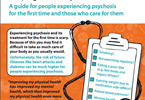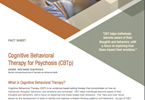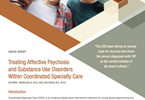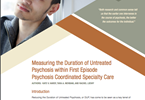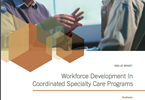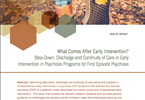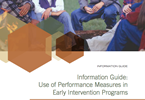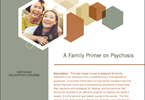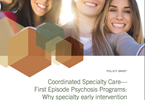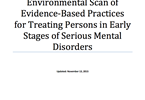Resources and Materials to Support Early Psychosis Program Development in the United States: Information for the IEPA 14 Conference
Since 2014, several national organizations have worked cooperatively to strengthen early intervention in psychosis (EIP) programming across the U.S. Resources available to the international community are provided below.
List of available resources:
- NASMHPD’s Technical Assistance Library contains nearly 100 resources, ranging from Toolkits, Issue Briefs, Fact Sheets, Policy Briefs, Brochures, Distance Education Courses and more.
- PEPPNET’s website provides a directory of known first episode psychosis programs across the United States, information about workgroups, links to past educational webinars and annual conferences, as well as a list of relevant resources for first episode psychosis.
- NIMH-funded EPINET is a national learning healthcare system for early psychosis. EPINET links early psychosis clinics through standard clinical measures, uniform data collection methods, data sharing agreements, and integration of client-level data across service users and clinics. Clients and their families, clinicians, health care administrators, and scientific experts partner with EPINET to improve early psychosis care and conduct large-scale, practice-based research. Initiated in 2019 and sponsored by the National Institute of Mental Health, the EPINET initiative includes 8 regional Hubs, over 100 early psychosis clinics across 17 states, and the EPINET National Data Coordinating Center (ENDCC).
- SAMHSA-funded SMI Adviser is supported by the American Psychiatric Association to promote educational activities related to a variety of topics, including first episode psychosis. Their website includes a Knowledge Base of resources, archived national webinars that offer continuing education units, and other educational materials.
- SAMHSA’s Mental Health Technology Transfer Early Psychosis Workgroup shares information, educates stakeholders, promotes resources, and guides the development of best practices for first episode psychosis.
In federal fiscal year 2014, Congress directed SAMHSA to require state behavioral health authorities to set aside five percent of their Community Mental Health Services Block Grant (MHBG) “to support evidence-based programs that address the needs of individuals with serious mental illness, including psychotic disorders. This original directive suggested that states focus their efforts on the treatment of first episode psychosis (FEP), and encouraged states to consider developing coordinated specialty care (CSC) programs with their additional MHBG funds. In December 2015, Congress directed SAMHSA to double the Set Aside funds from five percent to 10 percent.
Since 2014, NRI has worked closely with SAMHSA and the state behavioral health authorities to implement and improve the delivery of CSC services for individuals experiencing FEP. Together with NASMHPD, NRI has created and supported the development of a variety of technical assistance and informational resources for stakeholders, including SBHAs, providers, educators, and families. NRI was also instrumental as a subcontractor to Westat in the implementation of the Mental Health Block Grant Ten Percent Set Aside National Evaluation, sponsored by SAMHSA, NIMH, and ASPE.
On this page, you will find a comprehensive list of technical assistance and informational resources developed by NRI and its partners related to FEP and the implementation of CSC programs.
Results from the MHBG Ten Percent Set Aside National Evaluation
As of September 6, 2019, the national Mental Health Block Grant Ten Percent Set Aside (MHBG 10%) Study for addressing first episode psychosis (FEP) is complete. The three-year study focused on how the MHBG 10% Set Aside impacted access to essential services for individuals with FEP. As part of the end-of-study conclusion, in August 2019, study sites and behavioral health authorities were invited to participate in an interactive webinar to hear about preliminary study findings. The handouts distributed during the webinar are provided below.
Archived Webinars
2014
- Measuring the Impact of Early Intervention Programs for First Episode Psychosis: Experiences and Lessons Learned
- Community Outreach and Prevention as an Element of Early Intervention in Psychosis
- Funding Strategies for Early Psychosis Intervention Models
- Prep for Success: Lessons Learned in Implementing Models for Early Intervention in Psychosis
- Cognitive Behavioral Therapy and Recovery with Persons in Early Stages of Serious Mental Illness
- Preventing Neuroprogression in Bipolar Disorder by Early Intervention
2015
- New Informational Resources on Addressing First Episode Psychosis: Product Overview
- Strategies for Funding Coordinated Specialty Care Initiatives
- Using the 5% MHBG Set-Aside to Support Programming for First Episode Psychosis: Activities and Lessons Learned from the State of Ohio
- Promoting Meaningful Family Involvement in Coordinated Specialty Care Programming for Persons with First Episode of Psychosis
- Practical Approaches to Measuring Fidelity in Coordinated Specialty Care for First Episode Psychosis
- Supported Education as a Component of Coordinated Specialty Care for Persons with First Episode Psychosis
- Opportunities for Utilizing Peer Support and other Meaningful Peer Roles in Coordinated Specialty Care
- An Overview of Coordinated Specialty Care (CSC) for Persons with First Episode Psychosis
- Inventory and Environmental Scan of Evidence - Based Practices for Treating Persons in Early Stages of Serious Mental Disorders
2016
















